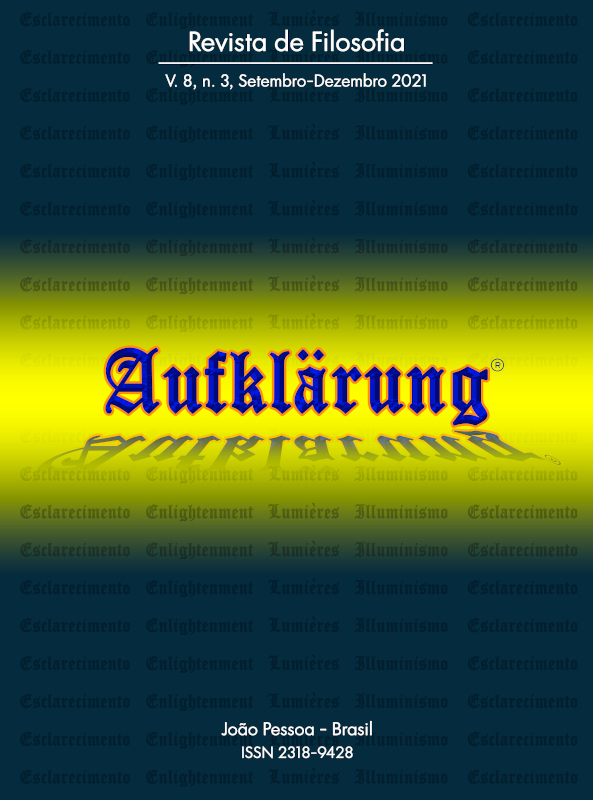Pragmatism from the perspective of a social philosophy
DOI:
https://doi.org/10.18012/arf.v8i3.60933Palavras-chave:
Pragmatism, social philosophy, the vitality of PragmatismResumo
Pragmatism is a philosophy that has made a unique contribution to the history of philosophical thought. Practicalism in combining and inheriting the view of modern intellectual and bringing the stylish colors of western philosophical schools quite well. Pragmatism started with the theories of Peirce, James, Dewey, and Mead, which Schiller, Lewis, Hook developed, and Quine, then continued to grow into neopragmatism which is manifested in Rorty's literature and politics. Rather than asking which variants are qualified as authentic Pragmatism, it is better, more effective, and forward-looking to ask what we can learn from the old and salvage from the new.
Downloads
Referências
Burke, F. T. What Pragmatism was. Indiana University Press, 2013.
Central Committee of the Communist Party of Vietnam; "Resolution No. 29-NQ/TW, dated 4/11/2013 "Transforming a new and comprehensive version of education and training, responding to public requests modernization in the context of the market economy." Hanoi, 2013.
Charles S Peirce; How to make our Ideas Clear. Indiana University Press, 1978.
Dewey, J. Experience and education. In The educational forum. Taylor & Francis Group, 1986, September, 241-252.
Dewey, J., Fink, H., Hartnack, J., & Sløk, J. John Dewey. Collier-Macmillan, 1970, 87-88.
Dung, N. T.; In the face of American Pragmatism. Vol. 128(6A). Hue: Hue University Journal of Science: Social Sciences and Humanities, 2019.
Festenstein, M; Inquiry, and Democracy in Contemporary Pragmatism. Bardwell Press, 2007.
Fishman, S. M., & McCarthy, L. P. John Dewey and the challenge of classroom practice. Teachers College Press, 1998.
Frankena, William K.; Raybeck, Nathan; Burbules, Nicholas; "Philosophy of education." In Guthrie, James W. Encyclopedia of Education." New York, 2002.
Frega, R.; Pragmatism and the wide view of democracy. Gewerbestrasse, Switzerland: Palgrave Macmillan, 2019.
Garrison, J., Podeschi, R., & Bredo, E. (Eds.). William James and education. Teachers College Press, 2002.
Gutek, Gerald. Philosophical and Ideological Voices in Education. NY: Pearson Education, 2004, 73.
Haack, S.; "Pragmatism, old and new." Contemporary Pragmatism 1(1) (2004): 3-4.
Hickman, L. A., & Hickman, L. Philosophical tools for technological culture: Putting Pragmatism to work. Indiana University Press, 2001.
K.Melville, translated by Dinh Ngoc Thach; Pham Dinh Nghiem; . Paths of modern Western philosophy. Education Publishing House, 1997.
Katz, E., & Light, A. (Eds.);. Environmental Pragmatism. Routledge, 2013.
Li, T., & Wu, Y.; Pragmatism in China-Chinese Pragmatism. In 2016 International Conference on Humanity, Education and Social Science. Atlantis Press, 2016.
Marx & Engels; . Marx & Engels Collected Works. Vol. 3. Hanoi: Truth National Political Publishing House, 1995.
Nahar, S., Budianti, Y., & Ro, Q. E. L. S; . "Akhlak and Academic Ethics: Idealism Among Pragmatism in Community Social Life." International Journal for Educational and Vocational Studies 2(12) (2020).
Oanh, Doan Huy. A brief history of education. Ho Chi Minh City: VNU Ho Chi Minh City Publishing House, 2004.
Pavlis, D., & Gkiosos, J.; "John Dewey, from philosophy of pragmatism to progressive education." Journal of Arts and Humanities 6(9) (2017): 23-30.
Richard Rorty; "Dewey and Posner on Pragmatism and Moral Progress". Electronic version, 2008.
Shusterman, R; "Making sense and changing lives: Directions in contemporary pragmatism." The Journal of Speculative Philosophy 19(1) (2005): 63-72.
Stroud, S. R.; "((2009). Pragmatism and the methodology of comparative rhetoric." Rhetoric Society Quarterly 39(4) (2009): 353-379.
William James; What is the Pragmatism. Cleveland and New York press, 1968.
Arquivos adicionais
Publicado
Como Citar
Edição
Seção
Licença

Este trabalho está licenciado sob uma licença Creative Commons Attribution 4.0 International License.
Política de Direito Autoral para os itens publicados pela Revista:
1.Esta revista é regida por uma Licença da Creative Commons aplicada a revistas eletrônicas. Esta licença pode ser lida no link a seguir: Creative Commons Attribution 4.0 International (CC BY 4.0).
2.Consonante a essa politica, a revista declara que os autores são os detentores do copyright de seus artigos sem restrição, e podem depositar o pós-print de seus artigos em qualquer repositório ou site.
Política de Direito de Uso dos Metadados para informações contidas nos itens do repositório
1. Qualquer pessoa e/ou empresa pode acessar os metadados dos itens publicados gratuitamente e a qulquer tempo.
2.Os metadados podem ser usados sem licença prévia em qualquer meio, mesmo comercialmente, desde que seja oferecido um link para o OAI Identifier ou para o artigo que ele desceve, sob os termos da licença CC BY aplicada à revista.
Os autores que têm seus trabalhos publicados concordam que com todas as declarações e normas da Revista e assumem inteira responsabilidade pelas informações prestadas e ideias veiculadas em seus artigos, em conformidade com a Política de Boas Práticas da Revista.






































